Research Alliance Ruhr
Internationale Spitzenforschung zu drängenden Zukunftsfragen - daran arbeitet die Universitätsallianz Ruhr seit 2021 in vier Research Centern und einem College. Die Initiative der Ruhr-Konferenz unterstreicht die starke Entwicklung der Wissensmetropole Ruhr. Hier entstehen attraktive Karrierechancen für herausragende Wissenschaftlerinnen und Wissenschaftler.
Aktuelles aus der Research Alliance Ruhr
Was macht Hitze mit uns – und mit der Gesellschaft?

DNA-Reparatur-Expertin kommt an die Universitätsallianz Ruhr
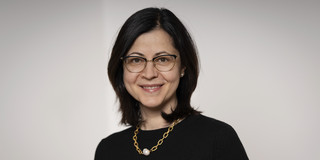
Rebekah Overdorf sorgt für Sicherheit und Privatsphäre im Internet

Spitzenforschung unter einem Dach
Die UA Ruhr bündelt ihre internationale Spitzenforschung zu drängenden Zukunftsfragen unter dem Dach der Research Alliance Ruhr. Mit vier Research Centern und einem geistes- und sozialwissenschaftlichen College setzt die Research Alliance neue Maßstäbe für eine interdisziplinäre und international wettbewerbsfähige Spitzenforschung. Dieses einzigartige Forschungsumfeld zieht weltweit führende Wissenschaftlerinnen und Wissenschaftler an.
Unterstützung durch die NRW-Landesregierung
Die Research Alliance wurde im Rahmen der Ruhr-Konferenz ins Leben gerufen und in der Aufbauphase mit 123 Millionen Euro von der Landesregierung Nordrhein-Westfalens gefördert. Diese Unterstützung unterstreicht das Vertrauen in das immense Potenzial des Forschungsstandorts. Damit wird die größte Metropolregion Deutschlands zum Innovationsmotor für die Welt von morgen.
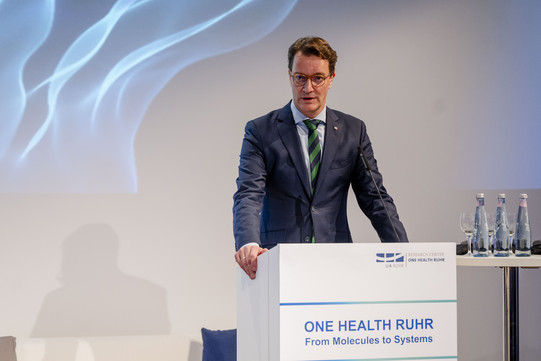
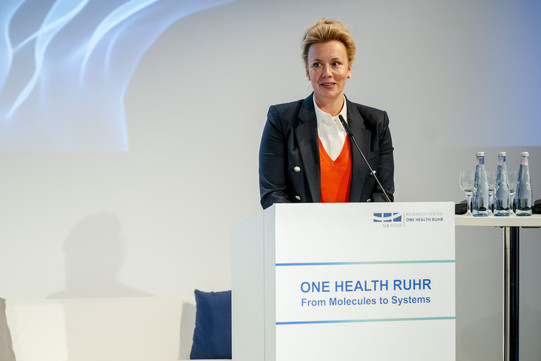
Vier Research Center und ein College
Im Mittelpunkt der Research Alliance stehen vier Research Center und ein College, die gemeinsam Antworten auf zentrale Zukunftsfragen entwickeln. Die Research Center konzentrieren sich auf die Themen Gesundheit, Nachhaltigkeit, Digitalisierung und Energiewende. Das College fördert die interdisziplinäre Zusammenarbeit und internationale Vernetzung in den Geistes- und Sozialwissenschaften. Alle fünf Einrichtungen bauen auf den gemeinsamen Stärken der drei Partneruniversitäten auf. Universitätsübergreifend werden bis zu 50 neue Forschungsprofessuren geschaffen. Bereits in der Aufbauphase konnte über die Hälfte dieser Stellen mit international renommierten Wissenschaftlerinnen und Wissenschaftlern besetzt werden, darunter zwei verbunden mit Humboldt-Professuren.
Research Center One Health Ruhr
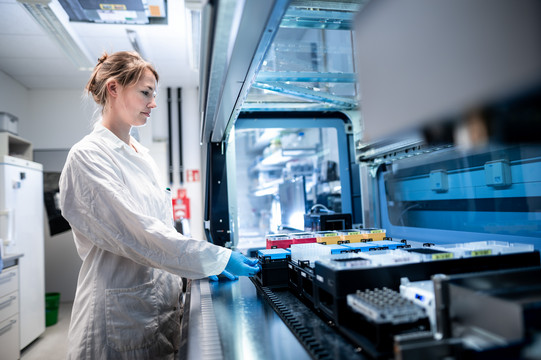
Das Research Center One Health Ruhr widmet sich den grundlegenden Mechanismen von Gesundheit und Krankheit – von der Molekülebene bis zum übergeordneten System. Interdisziplinär arbeiten hier Spitzenforscher:innen aus der Molekularbiologie und Wasserforschung, molekularer Krebsforschung und Neurowissenschaft zusammen. Die Vision der Forschenden ist es, das Thema Gesundheit in seiner Bedeutung und Interaktion von Umwelt und Mensch als international beispielgebendes Leuchtturmprojekt zu entwickeln.
Research Center Chemical Sciences and Sustainability

Das Research Center Chemical Sciences and Sustainability ist der Schrittmacher für wegweisende Forschung im molekularen Verständnis von chemischen Reaktionen, Prozessen und Produkten. Im Fokus stehen innovative, umweltfreundliche und ökonomisch-kompetetive technologische Anwendungen in verschiedenen Bereichen der Chemie – von Baustoffen bis hin zur Pharmazie.
Research Center Trustworthy Data Science and Security

Wie können vertrauenswürdige intelligente Systeme in sicherheitskritischen Anwendungen gestaltet werden? Das erforscht das Research Center Trustworthy Data Science and Security. Durch einen einzigartigen menschenzentrierten Ansatz deckt es das gesamte interdisziplinäre Forschungsspektrum von vertrauenswürdiger Datenanalyse, erklärbarem Maschinellem Lernen und datenschutzbewussten Algorithmen ab.
Research Center Future Energy Materials and Systems

Nachhaltige Materialien für die Energieanwendungen der Zukunft: dieses Ziel verfolgt das Research Center Future Energy Materials and Systems. Der Fokus liegt dabei auf der Erforschung grundlegender Eigenschaften und relevanter Prozesse bei der Herstellung und Anwendung komplexer Materialien. Ziel ist es, Schlüsselelemente für ein nachhaltiges Energiesystem zu schaffen und gleichzeitig energieintensive Verfahren zur Materialerzeugung und -verarbeitung durch regenerative Ansätze zu ersetzen.
College for Social Sciences and Humanities

Das College for Social Sciences and Humanities fördert exzellente Forschung in den Geistes- und Sozialwissenschaften innerhalb der UA Ruhr und stärkt ihre internationale Vernetzung. Es bietet Freiräume für innovative Forschungsvorhaben und versteht sich als Impulsgeber für interdisziplinären Austausch und Kollaboration. Seine Säulen bilden Forschungsprofessuren, Forschungsgruppen und ein internationales Senior-Fellowship-Programm, das internationalen Spitzenwissenschaftler*innen Forschungsaufenthalte an der UA Ruhr ermöglicht.
Stellenausschreibungen
Zur Zeit sind folgende Stellen innerhalb der Research Alliance Ruhr ausgeschrieben:
- Wissenschaftliche*r Mitarbeiter*in / Doktorand*in (w/m/d) für die Forschungsgruppe “Sweat – Sociology of Transpiration in the Age of Global Warming” am College for Social Sciences and Humanities, Teilzeit (65%), TV-L E13, Bewerbungsfrist: 14. Mai 2025 -> Ausschreibung
- Wissenschaftliche*r Mitarbeiter*in am Research Center One Health Ruhr, Fachgebiet Environmental Metagenomics, Volllzeit (100%), TV-L E13, Bewerbungsfrist: 16. Mai 2025 -> Ausschreibung
- Projektmanager*in in der Geschäftstelle des Research Center One Health Ruhr, Volllzeit (100%), TV-L E13, Bewerbungsfrist: 25. Mai 2025 -> Ausschreibung
- International Senior Fellowship Programme 2026/2027 at the College for Social Sciences and Humanities, application deadline: 25 May 2025 -> Call
Coordination Office
Jürgen Hein
Managing Director
Tel.: 0234 3223387
E-Mail senden

Julia Rüdel
Projektkoordinatorin
Tel.: +49 151 25754362
E-Mail senden
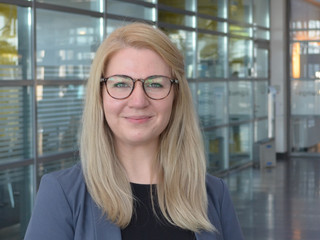
Kerstin Mork
Kommunikation
Tel.: +49 170 8340859
E-Mail senden
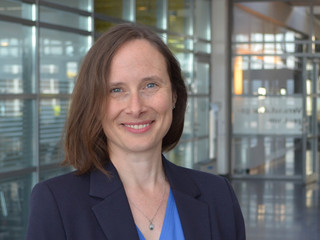
Anna Ackermann-Schrills
Teamassistenz
Tel.: 0234 32 29424
E-Mail senden
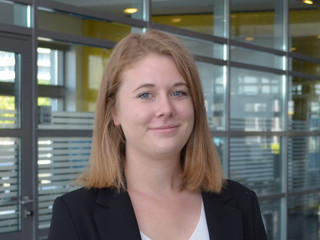
Die Research Alliance in den Medien
FAS: Forschung im Verbund stärker
WDR5 Quarks: Spitzenforschung made im Ruhrgebiet (ab min. 01:09:20)
Deutschlandfunk: Wunsch nach internationaler Sichtbarkeit
WAZ: Spitzenforschung im Revier - Von hier aus in die Zukunft
RVR-Magazin: Metropole Ruhr - Die Zukunft im Blick
Times Higher Education: Can Academia Revive Germanys Rust Belt?
WAZ: 75 Mio. Euro für Spitzenforschung im Ruhrgebiet
WAZ: Wie das Ruhrgebiet in der Forschung Weltspitze werden kann
Reden zur Unterzeichnung des Kooperationsvertrages (Stream der Staatskanzlei NRW auf X)

